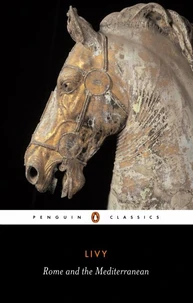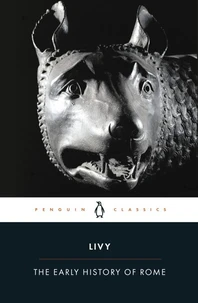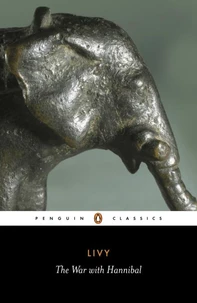The History of Rome, Books 37 to the End with the Epitomes and Fragments of the Lost Books. Rome's Grandeur and Decline: Epitomes and Fragments
Par : ,Formats :
Disponible dans votre compte client Decitre ou Furet du Nord dès validation de votre commande. Le format ePub est :
- Compatible avec une lecture sur My Vivlio (smartphone, tablette, ordinateur)
- Compatible avec une lecture sur liseuses Vivlio
- Pour les liseuses autres que Vivlio, vous devez utiliser le logiciel Adobe Digital Edition. Non compatible avec la lecture sur les liseuses Kindle, Remarkable et Sony
 , qui est-ce ?
, qui est-ce ?Notre partenaire de plateforme de lecture numérique où vous retrouverez l'ensemble de vos ebooks gratuitement
Pour en savoir plus sur nos ebooks, consultez notre aide en ligne ici
- Nombre de pages697
- FormatePub
- ISBN4057664635471
- EAN4057664635471
- Date de parution22/11/2019
- Protection num.Digital Watermarking
- Taille1 Mo
- Infos supplémentairesepub
- ÉditeurGOOD PRESS
Résumé
In "The History of Rome, Books 37 to the End with the Epitomes and Fragments of the Lost Books, " Livy provides an extensive narrative that chronicles the critical events of Rome's transformation from a republic to an imperial power. Known for his eloquent and sophisticated prose, Livy employs a blend of historical analysis and rhetorical flair, giving life to the characters of Rome'Äôs storied past.
This work concludes Livy'Äôs monumental history, capturing the tumultuous political landscape and cultural shifts during a pivotal era, while also addressing themes of virtue, morality, and the impact of fate on human endeavors. The inclusion of epitomes and fragments offers invaluable insights into lost works, enriching the reader's understanding of Roman historiography and scholarly discourse of the time.
Livy, a prominent Roman historian born in 59 BCE, is often regarded as one of the foundational figures in the crafting of historical narrative. His dedication to exploring the complexities of Rome'Äôs past is evident in his comprehensive analysis of civic duty, governance, and the moral fabric of society. Livy's experiences during the transitional period of Rome undoubtedly influenced his perspective on power and ethics, driving him to produce a work that both captivates and instructs through history.
This book is an essential read for scholars and enthusiasts alike, as it not only supplements Livy'Äôs earlier volumes but also serves as a crucial resource for understanding the depth of Roman history. Readers will find a meticulously crafted text that invites reflection on the enduring themes of governance, ambition, and the lessons that history imparts, making it a timeless addition to any library.
This work concludes Livy'Äôs monumental history, capturing the tumultuous political landscape and cultural shifts during a pivotal era, while also addressing themes of virtue, morality, and the impact of fate on human endeavors. The inclusion of epitomes and fragments offers invaluable insights into lost works, enriching the reader's understanding of Roman historiography and scholarly discourse of the time.
Livy, a prominent Roman historian born in 59 BCE, is often regarded as one of the foundational figures in the crafting of historical narrative. His dedication to exploring the complexities of Rome'Äôs past is evident in his comprehensive analysis of civic duty, governance, and the moral fabric of society. Livy's experiences during the transitional period of Rome undoubtedly influenced his perspective on power and ethics, driving him to produce a work that both captivates and instructs through history.
This book is an essential read for scholars and enthusiasts alike, as it not only supplements Livy'Äôs earlier volumes but also serves as a crucial resource for understanding the depth of Roman history. Readers will find a meticulously crafted text that invites reflection on the enduring themes of governance, ambition, and the lessons that history imparts, making it a timeless addition to any library.
In "The History of Rome, Books 37 to the End with the Epitomes and Fragments of the Lost Books, " Livy provides an extensive narrative that chronicles the critical events of Rome's transformation from a republic to an imperial power. Known for his eloquent and sophisticated prose, Livy employs a blend of historical analysis and rhetorical flair, giving life to the characters of Rome'Äôs storied past.
This work concludes Livy'Äôs monumental history, capturing the tumultuous political landscape and cultural shifts during a pivotal era, while also addressing themes of virtue, morality, and the impact of fate on human endeavors. The inclusion of epitomes and fragments offers invaluable insights into lost works, enriching the reader's understanding of Roman historiography and scholarly discourse of the time.
Livy, a prominent Roman historian born in 59 BCE, is often regarded as one of the foundational figures in the crafting of historical narrative. His dedication to exploring the complexities of Rome'Äôs past is evident in his comprehensive analysis of civic duty, governance, and the moral fabric of society. Livy's experiences during the transitional period of Rome undoubtedly influenced his perspective on power and ethics, driving him to produce a work that both captivates and instructs through history.
This book is an essential read for scholars and enthusiasts alike, as it not only supplements Livy'Äôs earlier volumes but also serves as a crucial resource for understanding the depth of Roman history. Readers will find a meticulously crafted text that invites reflection on the enduring themes of governance, ambition, and the lessons that history imparts, making it a timeless addition to any library.
This work concludes Livy'Äôs monumental history, capturing the tumultuous political landscape and cultural shifts during a pivotal era, while also addressing themes of virtue, morality, and the impact of fate on human endeavors. The inclusion of epitomes and fragments offers invaluable insights into lost works, enriching the reader's understanding of Roman historiography and scholarly discourse of the time.
Livy, a prominent Roman historian born in 59 BCE, is often regarded as one of the foundational figures in the crafting of historical narrative. His dedication to exploring the complexities of Rome'Äôs past is evident in his comprehensive analysis of civic duty, governance, and the moral fabric of society. Livy's experiences during the transitional period of Rome undoubtedly influenced his perspective on power and ethics, driving him to produce a work that both captivates and instructs through history.
This book is an essential read for scholars and enthusiasts alike, as it not only supplements Livy'Äôs earlier volumes but also serves as a crucial resource for understanding the depth of Roman history. Readers will find a meticulously crafted text that invites reflection on the enduring themes of governance, ambition, and the lessons that history imparts, making it a timeless addition to any library.









